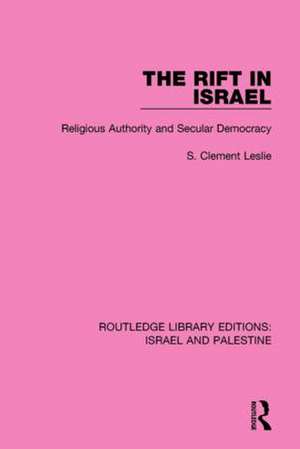The Rift in Israel (RLE Israel and Palestine): Religious Authority and Secular Democracy: Routledge Library Editions: Israel and Palestine
Autor S. Clement Leslieen Limba Engleză Hardback – 18 mai 2015
Preț: 763.39 lei
Preț vechi: 1154.11 lei
-34% Nou
Puncte Express: 1145
Preț estimativ în valută:
146.08€ • 152.90$ • 121.58£
146.08€ • 152.90$ • 121.58£
Carte tipărită la comandă
Livrare economică 31 martie-14 aprilie
Preluare comenzi: 021 569.72.76
Specificații
ISBN-13: 9781138902343
ISBN-10: 1138902349
Pagini: 198
Dimensiuni: 156 x 234 mm
Greutate: 0.41 kg
Ediția:1
Editura: Taylor & Francis
Colecția Routledge
Seria Routledge Library Editions: Israel and Palestine
Locul publicării:Oxford, United Kingdom
ISBN-10: 1138902349
Pagini: 198
Dimensiuni: 156 x 234 mm
Greutate: 0.41 kg
Ediția:1
Editura: Taylor & Francis
Colecția Routledge
Seria Routledge Library Editions: Israel and Palestine
Locul publicării:Oxford, United Kingdom
Public țintă
Postgraduate and UndergraduateCuprins
Background. 1. 1800 BC–AD 135 2. AD 135–1945 Division. 3. ‘Who is a Jew?’ 4. Segregation in the Schools 5. Religion 6. Non-Religion? Witness. 7. Basis 8. Two Pillars 8.1. The Army 8.2. The Kibbutz 9. Ingathering 10. Arabs 10.1. ‘Within Thy Gates’ 10.2. The Great Dilemma 11. Diaspora What is a Jew?. 12. Jewish Identity: Descriptive 13. Jewish Identity: Analytical
Descriere
The subject matter of this book, first published in 1971, is not less relevant, though less familiar, than the military adventures of Israel. For the book deals with the spiritual tensions that underlie and go far to explain the conduct of the country, standing as it does at the heart of some of the world’s most dangerous political conflicts. The superpowers confront at its borders. So do the ‘modern’ West and the force of Arab nationalism. It is the focus, too, of anti-Semitism, with its potential threat to the future of all Jews and of world peace. The questions here examined are rooted in the nature of Judaism and in the two distinct urges – religious and nationalist – that created Israel. Within its tiny territory some of mankind’s most urgent spiritual problems appear at their most intense. What do men live for: for themselves, their country, higher values? How these tensions are resolved will affect both the conduct of Israel, with its effects on the fortunes of all nations, and the thoughts of men everywhere about their own and their countries’ deeper problems. One section of the book deals with the institutions and policies of Israel as expressions of its inner spirit: the kibbutz, the army, the ingathering of exiles, the attitudes to Arabs within and beyond the frontiers, relations with world Jewry. Two final chapters describe and analyse the perennial problem of Jewish identity, seen in the light of the actions of a modern state.













